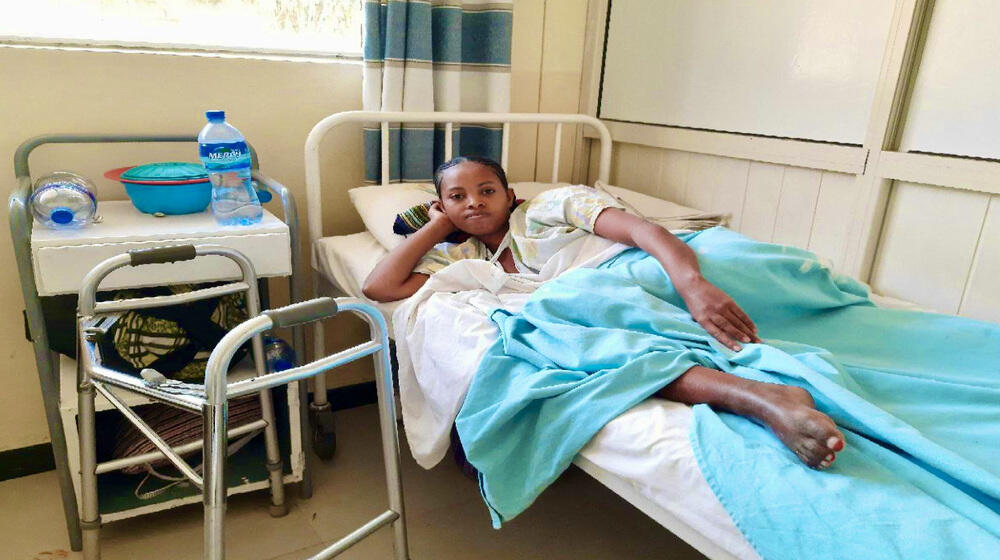MEKELLE, Tigray – “When Birchiko came to the centre, she only weighed 32kg. She was severely malnourished and her hips and knees were flexed and fixed,” explains Dr. Melaku Abreha, Medical Director at the Hamlin Fistula Centre in Mekelle. “She had developed joint contractures from prolonged immobility.”
Birchiko was nine months pregnant when conflict erupted in Ethiopia’s northern region of Tigray in November 2020. As people were fleeing their homes and armed forces were setting up road blockades, she went into labour. Unable to reach a health facility, she hid in the bush for seven days. When she finally delivered, her baby was stillborn. She says she was devastated.
In the days that followed, Birchiko realized something was wrong. “I was not able to control my urine and faeces,” she says wearily from her hospital bed. “I stopped eating and drinking trying to decrease the leaking, but I was not getting better.” Birchiko had never heard of fistula or that it was treatable and felt she had nowhere to turn. “I thought there was no cure for my suffering, so when I was able to return to my home, I took a room for myself and became increasingly isolated,” she says.
When there was a lull in fighting, her youngest brother brought her to the Fístula Centre in Mekelle, the capital of the Tigray Region. She has now been a patient for over seven months. In that time Doctor Melaku has performed three surgeries to repair Birchiko’s fistula, but the outlook is bleak. “That baby could be her first and last,” he says grimly. “I don’t think she may be able to walk or have sexual intercourse again.”
Devastating consequences
Birchiko’s story is tragic, but not uncommon. Obstetric fistula is a traumatic childbirth injury that occurs when women have prolonged and obstructed labour in the absence of access to timely and skilled emergency obstetric care. The sustained pressure of a baby’s head against the mother’s pelvis cuts off the blood supply, causing the tissue to die and fall away. The resulting hole between the bladder and/or rectum is called a fistula, and causes uncontrollable leaking of urine or faeces or both. It is undeniably a condition that affects some of the poorest and most vulnerable women worldwide.
Global estimates suggest that between 50,000 to 100,000 pregnant women develop a fistula each year, and in 90 per cent of cases the newborn does not survive. Fistula also brings shame, isolation, and rejection from families and communities, something Birchiko herself experienced.
Conflict increases risk factors
In Ethiopia, all the risk factors for fistula are present. Almost 80 per cent of health facilities have been looted or damaged in Tigray during the conflict, medical supplies are in short supply and the referral system has broken down. This has significantly compromised access to maternal health care – today less than 30% of births are attended by a skilled medical professional. The country also reports a high rate of teenage pregnancies, and while it does not discriminate by age, young girls are particularly vulnerable to fistulas because their bodies may not be ready for childbirth.
Dr. Melaku says that progress made to eliminate fistula in the years since the Hamlin Fistula Centre opened in 2006 has been all but eroded. The conflict, he says, has changed the sociodemographic characteristics of women experiencing the condition. “Before women were poor, uneducated, or from rural areas. Now, cases are common in urban areas and among educated women. Sexual violence and severe malnourishment among pregnant women also aggravate the severity of the cases.”
Restoring services and dignity
While women’s lives are torn apart by obstetric fistula, the condition is largely preventable with access to quality and skilled maternal and newborn health care. Across Ethiopia, UNFPA is working with partners to support efforts to end fistula by 2030 by building the capacity of midwives to deliver emergency obstetric care and deploying them to facilities where there are staff shortages. More than 13.5 metric tons of reproductive health supplies and equipment, including life-saving maternal health medicines, have been delivered to hospitals, health facilities and mobile health teams across the region to support safe births.
UNFPA is also coordinating training for clinics that provide free fistula repair surgery and working with survivors of fistula as advocates in their communities. In Tigray, Birchiko is one of 24 severe fistula cases that UNFPA is supporting with essential treatment and repair surgeries, with funding from the Danish Ministry of Foreign Affairs.
For Birchiko, fistula has been an agonizing experience both mentally and physically, yet she is grateful for the second chance at life and has hope for a future where she won’t be ostracized: “When I am fully recovered, I want to reopen my restaurant again. I enjoyed running my own business and working in my hometown.”


